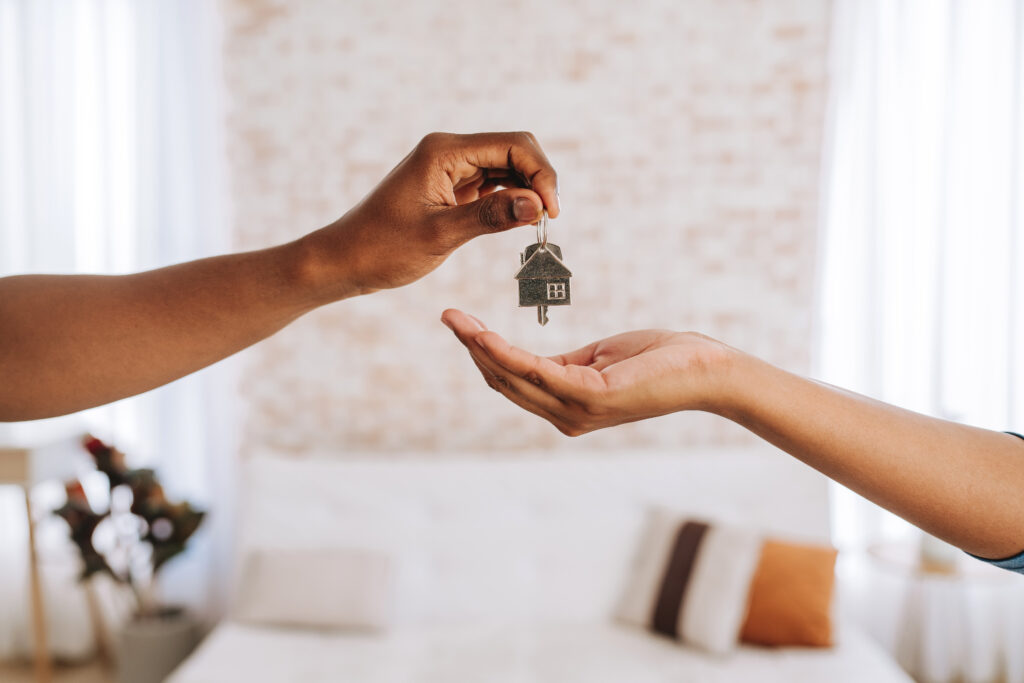Purchasing a house, whether your first home or your next home, is both exhilarating and nerve-wracking. The process of buying a house can be complex, involving multiple hurdles, and may be confusing at times. That’s why we’ve put together a guide to explain some of the jargon involved and help you understand the different stages of buying a home, including what happens and when.
Exchange and completion are largely the same whether buying a new build home or an existing house, but we’ll take a look at the nuances of buying a new property – something we know a fair amount about! You might also like to read our article How to Buy a New Build Home for more information about purchasing directly from a property developer.
What are the stages of buying a house?
Typically, the stages of buying a home include the following:

- Find a property
- Have your offer accepted
- Secure funds/mortgage
- Enlist conveyancers
- Surveys
- Exchange of contracts
- Completion
- Moving in
This list has been simplified and doesn’t include selling an existing home but buying and selling a house at the same time follow the same process, except you may have to sell your property to buy your next property. Other exceptions include if you’re buying your first home, moving from a rental property or you’re a cash buyer without a residence to sell.
We’ll be looking specifically at the later stages of buying a new home, the exchange of contracts and completion, and answering all those questions about how, what and when this takes place. Buying a new home is an exciting experience, especially if it is a house no one else has lived in before. It is important to hold onto this excitement and not get too bogged down by the paperwork and details. Ultimately, exchange and completion are the legal requirements of transferring ownership of a property and once completed, you can move into your brand new home.
What is exchange of contracts?
Once you’ve found a property you want to purchase, had an offer accepted, arranged a mortgage (if required) and instructed a conveyancer or solicitor to help secure your new home, your chosen conveyancer will begin preparing the property exchange contract for both parties to sign. A series of documents will be sent to you that eventually form your contracts of sale.
These will include a detailed inventory of the house you’re buying, known as the Fixtures, Fittings and Contents Form (TA10), a Property Information Form with a description of the property (TA6) and the transfer deed (TR1) to transfer ownership to yourself. Included in this contract will also be your agreed purchase price, any legal restrictions on the property, an anticipated completion date and the results of any searches or enquiries instructed by your conveyancer.
To exchange contracts is when both the buyer and seller sign and return these forms to their conveyancers, committing to the purchase and entering into a legally binding agreement. Your conveyancer will usually read the contract to you over the phone whilst recording your conversation, to preserve a verbal record that you have received this information. Both the seller and buyer’s conveyancers will email and post the signed contracts to each other, confirm over the phone that they have been signed, received and the date and time noted.

Is exchange of contracts legally binding?
Yes, exchanging house contracts is legally binding. Once you have signed your contract of sale, you are legally obligated to go through with your purchase.
If you decide to pull out of the sale after exchanging contracts, you will be in breach of your legal contract which may result in you losing your deposit, being served with a notice to complete instructing you to continue with the purchase or potentially being sued for damages.
It is vital that you read your contract carefully before signing as withdrawing from your agreement afterwards can incur severe penalties.
When do you exchange contracts?
Exchanging contracts on a house usually happens once any local searches have been completed, all paperwork has been filled in by the seller or property developer, the finance for buying the house is secure and proof of funds is obtained by the conveyancers, whether this is equity from a simultaneous house sale or cash.
On average it takes between 8-12 weeks to exchange house contracts after having an offer accepted, however when you purchase a new build home this can be much quicker. With Genesis Homes for instance, once a home has been reserved, we aim for exchange within 6-8 weeks. After the house contracts exchanged have been signed and received by the conveyancers, the final step is completion.
How do you complete?
After the exchange of house contracts, you have legally agreed to purchase your new home! There is not much that will delay completion from this point without significant fees being incurred. Completion is where you pay the balance for your new house and become the new legal homeowner.
After you instruct a conveyancer, they should ask if you have a date you’d like to work to for completion. Once a date has been agreed upon by both parties, and provided there is no delay with surveys, searches or funding, the agreed date for completion will be included in your contract of sale.
To finalise your purchase, the full balance of the agreed price should be transferred to your conveyancer on or before completion day. This payment may be requested by your conveyancer from your mortgage provider, or if the sale is a cash purchase, you will transfer the money to your conveyancer in advance who will hold it in escrow before transferring it on completion day.
Payment transfers usually occur in the morning and once the seller has received the funds, you’ll be notified that your purchase is complete and will be given access to your new home.
How long after exchange of contracts is completion?
From the exchange of contracts to completion, it can take anywhere from a week to a month. By the time all the information for your house purchase has been amalgamated into your contract, the majority of the work has already been carried out.
Exchanging and completing on the same day is possible but requires meticulous planning and coordination by all parties. It is very risky and not generally recommended as any unpredictable delays could incur additional charges on both sides. However, for buyers with no chain, cash purchasers, or those on a tight deadline, contract exchange and completion may be possible on the same day if planned carefully in advance and with the consent of all involved.
By allowing a reasonable interval between exchange and completion, mortgage lenders and conveyancers can prepare adequately for transferring funds to avoid delays, errors or financial risk.
How long does it take to complete on a house?
Sufficient time needs to be allowed for mortgage lenders to send funds, banks to receive them and the notification to conveyancers on both sides. This completion day checklist involves several crucial steps and multiple parties meaning it can take a few hours at least. On certain days of the week, conveyancers may be completing on more than one contract, and banks might receive multiple large transfer requests which can sometimes lead to delays.
Your conveyancers should request the funds in advance of completion or at least instruct the bank on which day to make the transfer in advance so that there is less chance of delay on completion day. Some mortgage lenders may require written notice of the fund transfer request up to 7 days in advance and this should also be taken into consideration when setting dates for completion.
Exchange and Completion FAQs
Hopefully our detailed look at the exchanging contracts process and what happens on completion has clarified what to expect when. Below we’ve listed additional frequently asked questions about exchange and completion to make the process as digestible and transparent as possible.
When do I need buildings and contents insurance?
You will need to arrange building and contents insurance to cover your new home that starts on or just before completion. This way your home is protected from the day you move in. Whilst not essential, mortgage lenders will require this as a condition of your mortgage agreement and unless you have the financial means to cover damage and theft, it is a relatively small amount to pay for cover that protects your investment.
Buildings Insurance
- You’ll need this from the point of legal completion (the day you get the keys).
- Your conveyancer will usually remind you of this as part of the legal process.
Contents Insurance
- This only covers your personal belongings (furniture, electronics, clothes, etc.).
- You don’t need it until you actually move your belongings into the property.
- Many buyers set it up to start on their moving-in day.
What can hold up exchange of contracts?
As mentioned at the start, buying a property is a complex process and there are several areas where delays may occur. We’ve listed some of the most common ones here.
- Buyer delaying exchange of contracts
- Local search findings
- Problems with title deeds
- Issues with leasehold properties
- Mortgage application delays
- Other parties in buying chains
- Busy conveyancers
- Unforeseen circumstances
The good news is that completing on a new build is usually much quicker than buying an older home as there is less chance of issues with searches and deeds, and as it is the developer who will be responsible for preparing for the sale rather than someone vacating the property.
Can you pull out after exchange of contracts?
Pulling out after exchange of contracts means that you risk losing your deposit and being served a notice to complete – effectively a notice forcing you to pay for the house. If there are significant issues with the property being bought, it may mean the purchase is no longer viable, but this is perhaps one of the few circumstances where you can withdraw from a purchase without severe penalty.
How long does exchange of contracts take on the day?
We are often asked, how long do solicitors take to exchange contracts? Essentially it is similar to completion – exchanging contracts can take several hours on the date of exchange. Each party should receive the contract in advance and have time to review the contents carefully. You may have given authority to exchange contracts in advance, signed and sent the contract back before your exchange date. Therefore, you only have to wait on confirmation that the seller has also signed their contract, and that your conveyancer has a signed copy in their possession.
On the day of exchange, your conveyancer may call you to run through the contract terms verbally and record the conversation for verification. Otherwise, once you and the seller have both had confirmation that all contracts are signed and received, contract exchange is official.
When do you transfer deposit to solicitor?
You are usually required to pay the deposit on exchange of contracts. Your conveyancer will ask you to transfer the funds, usually 10% of the agreed sale amount, in advance of exchanging contracts to ensure there are no delays between transferring banks.
An exception to this is if you’re selling your home to purchase a new one and using equity from your existing house to secure a new one. In this instance, you will not normally be required to transfer a deposit in order to exchange, although if you pull out of the sale after exchanging contracts, you will still be liable for the outstanding deposit amount.

Step-by-Step Summary of Exchange and Completion
- Contracts of sale are signed by both the seller and buyer
- Exchange of contracts – the buyer’s and seller’s conveyancers formally exchange the signed contracts, making the agreement legally binding.
- Buyer pays their deposit to conveyancer
- Respective conveyancers exchange signed contracts
- Completion date is agreed and confirmed
- Buyer’s conveyancer requests balance of funds from mortgage lender – where applicable
- Buyer pays any remaining purchase related funds
- On completion day buyer’s conveyancer sends funds to seller’s conveyancer to finalise the sale and transfer ownership
- Seller’s conveyancer sends payment to the seller
- Seller’s conveyancer informs the estate agent or developer funds have been received and instructs them to release the keys
- Buyer collects keys and can now move in at their leisure
This process is different if there is a chain in that funds are sent on throughout the chain in sequence if the seller is also purchasing a property or if the buyer has sold a property too.
Buying a New Build Home
Purchasing a brand new home follows much the same exchange and completion process that buying an older home does. The only difference is that the seller is a developer not another homeowner. This should make the new build buying process easier and quicker in terms of gathering paperwork and formulating a contract of sale.
Another perk of buying a new home is that there will someone there to meet you with your keys, show you around, help you find and operate any appliances and basically introduce you to your brand new house.
One of the most frequently asked questions surrounding buying a new build house is, when do you exchange contracts on a new build? Well, much like you do with buying an existing home, exchange of contracts should take between 6-8 weeks from your offer being accepted.
Other than that, the home buying process for new builds is very similar to that of buying an existing house. If you have any questions about buying a new build house or you’re in the market for a stunning new home, get in touch with our friendly sales team to find out more.
Check out our latest developments for beautiful new build homes in Cumbria that are truly sensational.


